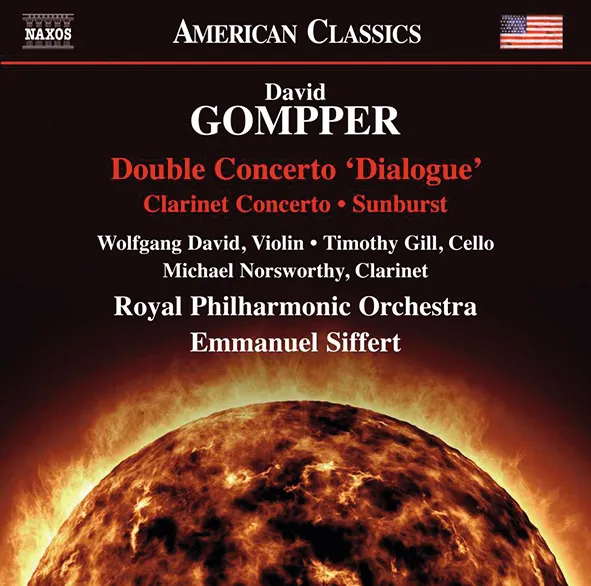
Gomppe Double Concerto (Dialogue); Clarinet Concerto: Sunburst Michael Norsworthy (clarinet), Wolfgang David (violin), Timothy Gill (cello); Royal Philharmonic Orchestra/Emmanuel Siffert Naxos 8.559835 62:17 mins
Once a pupil of the British serialist Humphrey Searle, the American David Gompper has been teaching at the University of Iowa since 1992. Also head coach of its rowing team, he clearly likes to keep fit. Musicians need their own athletic élan to play the tumult of notes crammed into his colourful orchestral scores, typically peppered with piano pinpricks, gong rumblings, and vibraphone cascades, and often structurally rooted in the mysteries of science or mathematics. A decade ago, the versatile Royal Philharmonic Orchestra recorded his Violin Concerto with Wolfgang David and Emmanuel Siffert for Naxos. Gompper’s stock has risen since then, and last year the team came back for more.
The Double Concerto for violin and cello, completed in 2016, begins magically and teasingly, with Timothy Gill’s cello pitched so high that it sounds much more like Wolfgang David’s violin. Over the work’s single span, textures gradually multiply in a string of conversational games, echoed by an orchestra that grows so active and clamorous that it takes a lengthy cadenza to remind us that the soloists still exist. The more compact Clarinet Concerto (2014), inspired by the training discipline parkour, and the purely orchestral Sunburst (2015) occupy much the same teeming world. Gompper’s vivid colour sense and willingness to blend atonal habits with reminders of the Romantic past make for relatively easy listening, while soloists and the RPO play with rigour and flair. Is there much to this music, though, beyond the busy surface parade, enough to reward repeated hearings? There I have doubts.
Geoff Brown